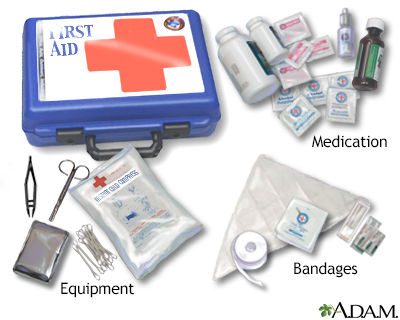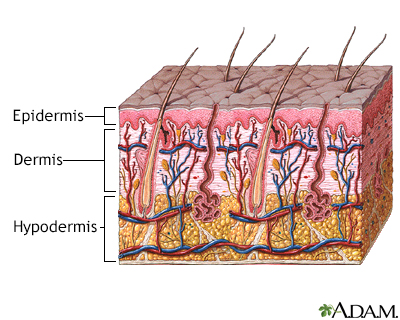Site Map
Chemical burn or reaction
Burn from chemicals
Chemicals that touch skin can lead to a reaction on the skin, throughout the body, or both.
Images



I Would Like to Learn About:
Considerations
Chemical exposure is not always obvious. You should suspect chemical exposure if an otherwise healthy person becomes ill for no apparent reason, particularly if an empty chemical container is found nearby.
Exposure to chemicals at work over a long period of time can cause changing symptoms as the chemical builds up in the person's body.
If the person has a chemical in their eyes, see first aid for eye emergencies.
If the person has swallowed or inhaled a dangerous chemical, call a local poison control center at 1-800-222-1222.
Symptoms
Depending on the type of exposure, the symptoms may include:
-
Abdominal pain
-
Breathing difficulty
- Bright red or bluish skin and lips
- Convulsions (seizures)
-
Dizziness
- Eye pain, burning or watering
-
Headache
-
Hives, itching, swelling, or weakness resulting from an allergic reaction
- Irritability
-
Nausea and vomiting
- Pain where the skin has come in contact with the toxic substance
-
Rash, blisters, burns on the skin
-
Unconsciousness or other states of altered level of consciousness
First Aid
- Make sure that all rescuers have appropriate safety gear, this may include eye protection and skin protection.
- Remove the victim from the area of exposure, or make sure the cause of the burn or exposure has been removed. Try not to come in contact with it yourself. If the chemical is dry, brush off any excess. Avoid brushing it into your eyes or the victim's eyes. Remove any clothing and jewelry.
- Flush the chemicals off the skin surface using cool running water for 15 minutes or more unless the chemical exposure is to dry lime (calcium oxide, also called 'quick lime') or to elemental metals such as sodium, potassium, magnesium, phosphorous, and lithium.
- Treat the person for shock if they appear faint, pale, or if there is shallow, rapid breathing.
- Apply cool, wet compresses to relieve pain.
- Wrap the burned area with a dry sterile dressing (if possible) or clean cloth. Protect the burned area from pressure and friction.
- Minor chemical burns will most often heal without further treatment. However, if there is a second or third degree burn or if there is an overall body reaction, get medical help right away. In severe cases, don't leave the person alone and watch carefully for reactions affecting the entire body.
Note: If a chemical gets into the eyes, flush them with water right away. Continue to flush the eyes with running water for at least 15 minutes. Get medical help right away.
Do Not
- Do not apply any household remedy such as ointment or salve to a chemical burn.
- Do not become contaminated by the chemical as you give first aid.
- Do not disturb a blister or remove dead skin from a chemical burn.
- Do not try to neutralize any chemical without consulting the poison control center or a health care provider.
When to Contact a Medical Professional
Call for medical help right away if the person is having difficulty breathing, is having seizures, or is unconscious.
Prevention
- All chemicals should be stored out of the reach of young children -- preferably in a locked cabinet.
- Avoid mixing different products that contain toxic chemicals such as ammonia and bleach. The mixture can give off hazardous fumes.
- Avoid prolonged (even low-level) exposure to chemicals.
- Avoid using potentially toxic substances in the kitchen or around food.
- Buy potentially poisonous substance in safety containers, and buy only as much as needed.
- Many household products are made of toxic chemicals. It is important to read and follow label instructions, including any precautions.
- Never store household products in food or drink containers. Leave them in their original containers with the labels intact.
- Safely store chemicals immediately after use.
- Use paints, petroleum products, ammonia, bleach, and other products that give off fumes only in a well-ventilated area.
Related Information
Eye emergencies
Substance use
References
Iyer G, Srinivasan B, Rao NK. Acid and alkali burns. In: Yanoff M, Duker JS, eds. Ophthalmology. 6th ed. Philadelphia, PA: Elsevier; 2023:chap 4.26.
Levine MD. Chemical injuries. In: Walls RM, ed. Rosen's Emergency Medicine: Concepts and Clinical Practice. 10th ed. Philadelphia, PA: Elsevier; 2023:chap 55.
Mazzeo AS. Burn care procedures. In: Roberts JR, Custalow CB, Thomsen TW, eds. Roberts and Hedges' Clinical Procedures in Emergency Medicine and Acute Care. 7th ed. Philadelphia, PA: Elsevier; 2019:chap 38.
BACK TO TOP
Review Date:
11/2/2023
Reviewed By:
Jesse Borke, MD, CPE, FAAEM, FACEP, Attending Physician at Kaiser Permanente, Orange County, CA. Also reviewed by David C. Dugdale, MD, Medical Director, Brenda Conaway, Editorial Director, and the A.D.A.M. Editorial team.

|
A.D.A.M., Inc. is accredited by URAC, also known as the American Accreditation HealthCare Commission (www.urac.org). URAC's accreditation program is an independent audit to verify that A.D.A.M. follows rigorous standards of quality and accountability. A.D.A.M. is among the first to achieve this important distinction for online health information and services. Learn more about A.D.A.M.'s editorial policy, editorial process and privacy policy. A.D.A.M. is also a founding member of Hi-Ethics and subscribes to the principles of the Health on the Net Foundation (www.hon.ch).
|
The information provided herein should not be used during any medical emergency or for the diagnosis or treatment of any medical condition. A licensed medical professional should be consulted for diagnosis and treatment of any and all medical conditions. Call 911 for all medical emergencies. Links to other sites are provided for information only -- they do not constitute endorsements of those other sites. © 1997-
A.D.A.M., Inc. Any duplication or distribution of the information contained herein is strictly prohibited.
© 1997-2026

All rights reserved.




